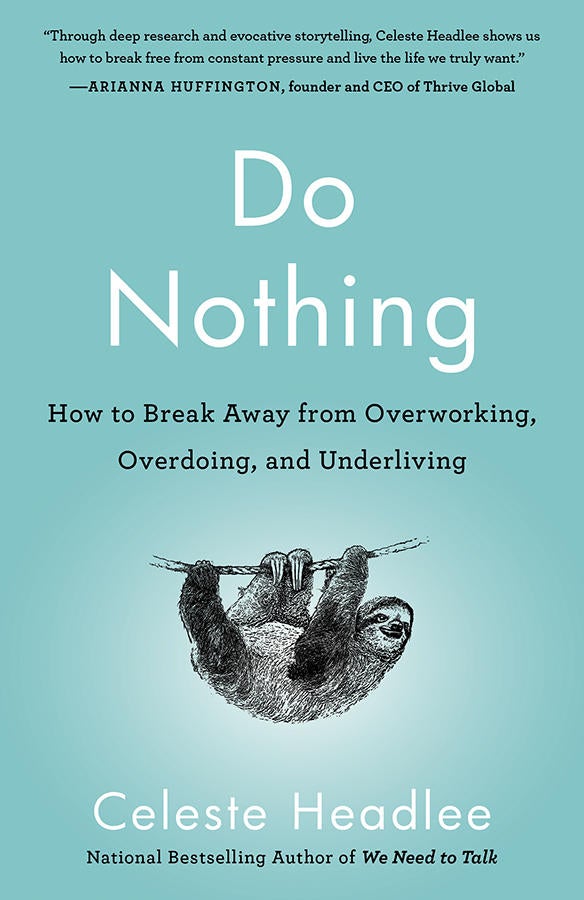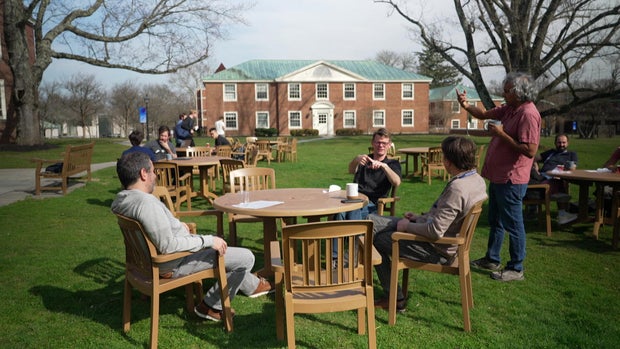CBS News
The importance of being lazy

For most of her working life, Celeste Headlee never made any time for any time-off. “I used to say, ‘I can outwork anybody.’ That used to be, like, my calling card,” she said.
A single mother, at one point she was balancing childcare with seven different jobs: “I am a professional opera singer, so I sang for the Michigan Opera Theatre. I also did a lot of writing jobs. I wrote for the Detroit News. I was filing freelance pieces for National Public Radio.”
CBS News
But in 2017, at age 47, she hit a wall. “I was irritable all the time,” she said. “I was tired all the time. I started getting sick. And I’m a very healthy [person], I don’t generally get sick. So, obviously, I was overworked. And that was a problem that had to be solved.”
First step: She quit her full-time job. Second, equally drastic move: She took a two-week cross-country train ride, much of it without Wi-Fi, just to see what would happen. For the first three or four days, Headlee said, she felt panic: “You know when you leave your house and you realize you don’t have your cellphone on you, and you’re like gasp!!!? But eventually it just started to feel okay.”
By the time she got home, she’d had an epiphany: “Idleness, leisure time is necessary for our own health and well-being,” Headlee said.
Harmony
The title of her recent book says it all: “Do Nothing.” But she argues social pressures make doing nothing hard to do. After all, we might be accused of the dreaded sin of laziness! “If somebody’s ‘lazy,’ they’re not earning their place in society, they’re a bum,” Headlee said.
Professor Lonnie Golden, who teaches economics at Penn State Abington, said, “Laziness gets a bum rap from religion, it gets a bum rap from capitalism, it gets a bum rap because we are trying to be productive in our lives.”
And productivity is the real priority in America, says Golden. “The big payoffs in the U.S. are making yourself available for a promotion, or building your own business from scratch. So, there’s many good rewards from that. There’s no reward for being lazy, I think it’s fair to say. When you’re at your high school reunion, you don’t want to be saying, you know, ‘I’ve been doing nothing’!”
According to a recent Wall Street Journal/NORC survey on the importance of values (ranking them as “very” or “somewhat” important), Americans value hard work (94%) over just about everything else, including self-fulfillment (91%), marriage (70%), patriotism (73%), religion (60%), and tolerance for others (90%).
Even retirees have a hard time doing nothing. “It gets to be what’s called the conspicuous busyness,” said Golden. “Like, Hey, look how busy I am, and look how much time I’m spending [on doing things]. Maybe it’s volunteering. But it should be okay to say, ‘I’m retired. And as a result, I can be lazy when I feel like being lazy.'”
But, it’s not, Headlee says, due to a culture of anti-laziness. “We have all been basically brainwashed to believe that we have to work hard, or we’re not of value,” she said.
Which may explain why employers seem to love employees who say they can multi-task. Really, what could be less lazy?
Professor Earl K. Miller, a neuroscientist at MIT’s Picower Institute for Learning and Memory, said, “We hear this all the time. Businesses ask candidates, ‘Are you good at multi-tasking?’ And they want to hear, ‘Yes!’ But what they should want to hear is, ‘No!'”
Miller has sobering news for a culture obsessed with juggling jobs – that it is physically impossible for us to multi-task: “Out brains are very one-track,” he said. “We can hold only one or two thoughts in mind at a time. That is it. We’re very single-minded.”
Our poor brains, when struggling to multi-task, instead simply slow down, and make mistakes. A far better plan, says Miller, is to try doing no tasks at all: “You know, a lot of times some of your best thoughts come to you when your conscious mind is out of the way, when you allow these unconscious thoughts to bubble up. And sometimes it’s good to be lazy – not be lazy, but to tune out a bit, and let these thoughts bubble up.”
That advice is a way of life at the 93-year-old Institute for Advanced Study, an academic research center in Princeton, New Jersey, where – remarkably – doing nothing does not have a bad name, says director David Nirenberg.
There is no “typical” day at the Institute, according to Nirenberg: “You can do whatever you want. The day is yours.”
CBS News
When not gathering for tea each day, scholars may take a walk in the woods, sit by the pond, or even nap (!). “We all need space for non-intentional activity, non-intentional thought, contemplation,” Nirenberg said. “That’s why weekends exist. I think that’s why so many of our faith traditions have introduced days of rest.”
“But we think of that as being ‘lazy,'” said Spencer.
“I think it’s a crucial part of being human,” Nirenberg replied.
Not to imply that anyone’s slacking off at the Institute; it has been an intellectual home to Albert Einstein, J. Robert Oppenheimer, and 35 Nobel laureates.
Headlee points out that some of the productive and renowned people in history worked a limited number of hours per day: “Charles Dickens, Charles Darwin, Henri Poincaré, I mean, these are people who had a focused time of four hours. And the rest of the time, what were they doing? They were dining, they were sitting in the garden, they were hanging out with friends.”
In other words, being lazy? “To our 21st century eyes, yeah, they were being lazy,” Headlee said. “To them, they were living their life.”
And she wants all of us to start living our lives, too. Asked if she had one message to share about laziness, Headlee said, “The most successful animals on the planet are the laziest. Think about how long lions lie around on the savanna. And when they need food, there’s a burst of energy and activity, and they get it. And then they go back to lying around. If you look at the apex predators, some of the most successful species on planet Earth, they spend a good amount of their time doing nothing at all.”
For more info:
- “Do Nothing: How to Break Away from Overworking, Overdoing, and Underliving” by Celeste Headlee (Harmony), in Trade Paperback, eBook and Audio formats, available via Amazon, Barnes & Noble and Bookshop.org
- Celeste Headlee (Official site)
- Lonnie Golden, Professor of Economics and Labor-Human Resources, Penn State Abington
- Earl K. Miller, Professor of Neuroscience, Picower Institute for Learning and Memory, Massachusetts Institute of Technology
- Institute for Advanced Study, Princeton, N.J.
Story produced by Amiel Weisfogel. Editor: Remington Korper.
See also:
CBS News
Trump to hold second rally at site of attempted assassination

Watch CBS News
Be the first to know
Get browser notifications for breaking news, live events, and exclusive reporting.
CBS News
Eye Opener: At least 70 people killed in gang attack in Haiti, United Nations says

Watch CBS News
Be the first to know
Get browser notifications for breaking news, live events, and exclusive reporting.
CBS News
Floods, landslides struck parts of Bosnia as residents slept, leaving at least 16 dead and several missing

A severe rainstorm struck Bosnia overnight Friday, killing at least 16 people in floods and landslides in several towns and villages in central and southern parts of the country, with surging waters rushing into people’s homes as they were sleeping.
Rescue services in the south said several people were missing and called on volunteers and the army to assist as roads were closed and houses left without electricity.
Josip Kalem, a resident of Fojnica, one of the towns hit by the floods, said his dog’s barking woke him up at around 4 a.m. When he came out on the terrace, he saw the water rising rapidly.
“I came down, woke up my wife, and we looked around, we could not get out of the house. We saw more and more water coming in,” he said. “All of a sudden, the water was flooding the garage, basement, my car — everything. The water swept it all away, including my dog. Flood took it downstream.”
Andja Milesic, another resident of Fojnica, also said she was caught by surprise in the middle of the night.
“When I woke up, my bedroom floor was already soaked. I walked into the hallway — water was everywhere — the living room, everywhere,” she said. “It was horrible.”
Armin Durgut / AP
Darko Juka, a spokesman for the local administration, said at least 14 people had died in and around the southern town of Jablanica. Officials later said two more bodies have been found.
“Those are the ones who have been discovered by rescuers,” he said. “We still don’t know the final death toll.”
“I don’t remember such a crisis since the war,” Juka said referring to the 1992-95 war in Bosnia that left the country in ruins. “The scale of this chaotic situation is harrowing.”
Defense Minister Zukan Helez told N1 regional television that troops have been engaged to help and that the casualties were reported.
Helez said that “hour after hour we are receiving news about new victims. … Our first priority is to save the people who are alive and buried in houses where the landslides are.”
A pregnant woman lost her baby after she was rescued from the floods and transferred to a hospital in the regional center of Mostar. Authorities said doctors were fighting for her life as well. Separately, a child was successfully rescued and hospitalized, local officials said.
Rescue services in the towns of Jablanica and Kiseljak said the power was off overnight and mobile phones lost their signal.
The Jablanica fire station said that the town was completely inaccessible because roads and trainlines were closed.
“The police informed us that the railroad is also blocked,” the state rescue service said in a statement. “You can’t get in or out of Jablanica at the moment. Landline phones are working, but mobile phones have no signal.”
It urged people not to venture out on the flooded streets.
Human-caused climate change increases the intensity of rainfall because warm air holds more moisture. This summer, the Balkans were also hit by long-lasting record temperatures, causing a drought. Scientists said the dried-out land has hampered the absorption of floodwaters.
Armin Durgut / AP
Drone footage broadcast on Bosnian media showed villages and towns completely submerged under water, while videos on social networks showed dramatic scenes of muddy torrents and damaged roads.
One of the busiest roads linking Sarajevo with the Adriatic coast via Jablanica was swept into a river, together with a railway line in a huge landslide, according to photos.
“Many people are endangered because of big waters and landslides. There is information about victims and many injured and missing persons,” said the civic protection service.
Authorities urged people to stay on the upper floors of their homes. Reports said surging waters swept away domestic animals and cars as the water swiftly filled up lower floors of buildings.
The heavy rains and strong winds were also reported in neighboring Croatia, where several roads were closed and the capital of Zagreb prepared for the swollen Sava River to burst its banks.
Heavy winds have hampered traffic along the southern coast of the Adriatic Sea, and flash floods caused by heavy rain threatened several towns and villages in Croatia.
Floods caused by torrential rains were also reported in Montenegro, south of Bosnia, where some villages were cut off and roads and homes flooded.
In 2014, floodwaters triggered more than 3,000 landslides across the Balkans, laying waste to entire towns and villages and disturbing land mines leftover from the region’s 1990s war, along with warning signs that marked the unexploded weapons.







